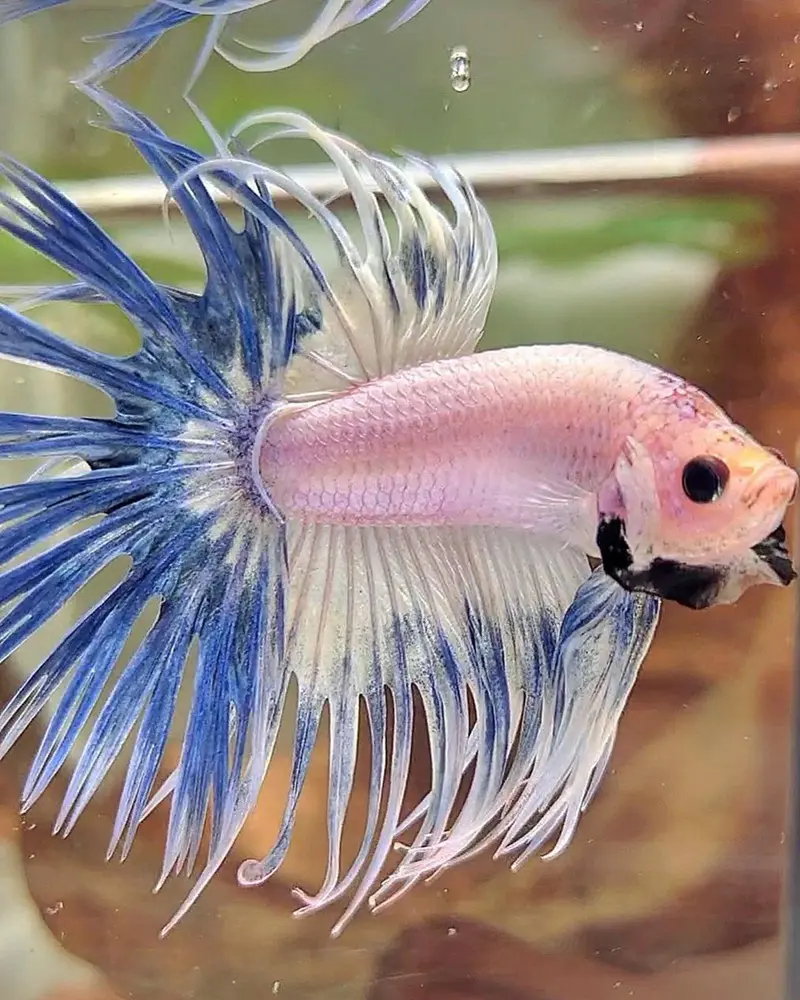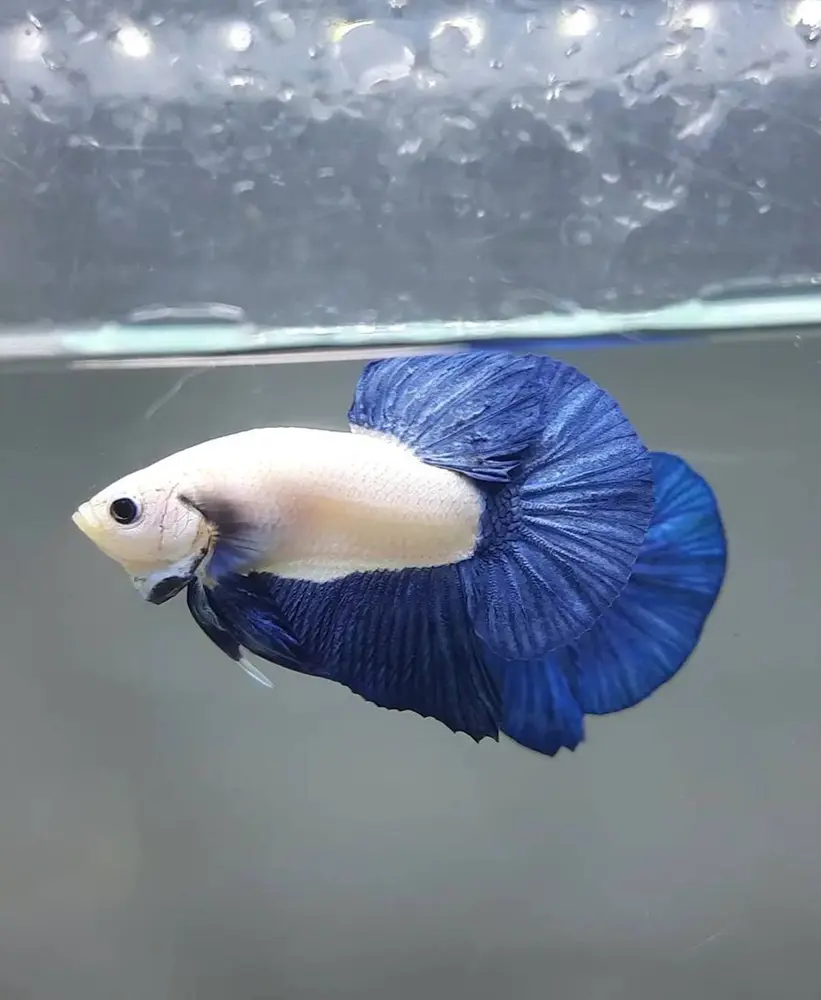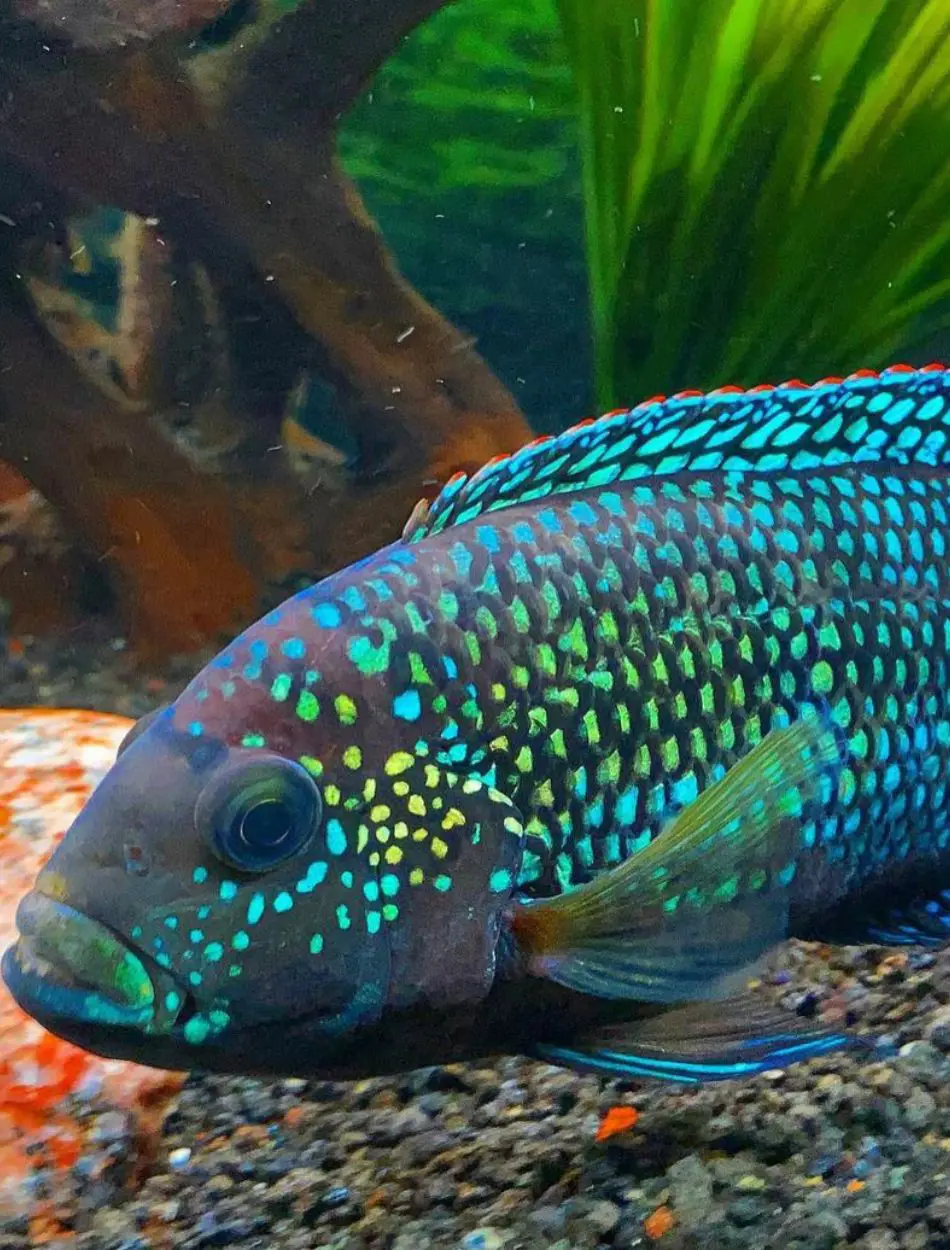When And How Do Betta Fish Sleep

Betta fish sleep primarily at night, resting at the bottom of their tank or near plants. They remain still with slightly closed fins, often finding a secure spot to avoid disturbances.
Also known as the Siamese fighting fish, bettas are native to Southeast Asia. These colorful fish are relatively active, despite their small size but require plenty of rest to recover their energy.
This article gives insight into the sleeping pattern of betta fish and everything to know about these exotic fish's exotic behaviors.
Do Betta Fish Sleep?
Like most animals, betta fish need adequate sleep to remain in perfect shape. They are diurnal, meaning they are active during the day and rest at night. Betta fish sleep by becoming motionless, often resting on leaves, at the bottom of the tank, or in a hiding spot. Their sleep is typically light, allowing them to quickly wake up if disturbed.
Proper sleep is crucial for betta fish to maintain good health and energy. Sleep helps with stress recovery, immune system support, and overall well-being. A consistent day-night cycle in the aquarium, with periods of darkness, is necessary for promoting healthy sleep patterns in bettas.
How Many Hours Do Betta Fish Sleep?

Betta fish typically sleep for about 12-14 hours a day. While they mostly rest at night, occasional short naps during the day are also common.
Similarly, these fish don't experience REM sleep as mammals do, their rest is essential for recovery and health. Still, providing a consistent light-dark cycle is a vital part of their care.
Betta fish sleeping a lot could indicate stress, poor water quality, low temperatures, or illness. Conversely, if a betta sleeps too little, it might be due to excessive light, tank disturbances, or health issues. To address these concerns, provide a stable environment, proper filtration, and a light schedule that mimics natural day-night cycles.
How Do Betta Fish Sleep?
Betta fish mostly remain motionless when they sleep. They do not have eyelids, so their eyes remain open while they sleep. These fish enter a light sleep state, allowing them to remain alert to potential dangers. They often sleep in sheltered areas or near objects that provide cover.
In their natural habitat, bettas are vulnerable to predators while sleeping. Their sensitive sleep allows them to wake quickly if disturbed by movement or changes in water conditions. The combination of f light sleep and strategic resting spots helps them avoid threats in the wild.
Where Do Betta Fish Sleep?
Betta fish prefer to sleep in secure, sheltered locations within their environment where they feel safe and hidden. They choose spots that offer a sense of protection and comfort, which can vary depending on the tank setup and the betta’s personality.
Ideal Betta Fish Resting Spots
1. Under Leaves or Plants
Bettas often sleep under broad leaves or plants. These spots replicate their natural habitat, providing cover and a sense of security.
The leaves create shaded areas, which help them feel hidden from potential threats. In addition, plants help reduce light levels, mimicking nighttime conditions that encourage rest.
2. On the Substrate
Some bettas prefer to rest on the substrate at the bottom of the tank. The substrate provides a stable, flat surface where they can relax.
This spot is particularly useful if there are caves or decorations nearby, offering additional shelter. Bettas that sleep on the substrate often look for low-light, quiet areas to avoid disturbances.
3. Near the Water Surface
Bettas are labyrinth fish, which means they can breathe air from the surface. Sleeping near the water surface allows them to easily access oxygen when needed without having to swim far.
They might rest on floating plants or near objects that keep them close to the surface. Just make sure that they can breathe comfortably even while resting.
Identifying A Sleeping Betta Fish
Determining whether a betta fish is sleeping or not is pretty straightforward. Check their activity level; lack of motion is the key indicator of sleep.
Look for these key signs that indicate rest:
Reduced Movement
A sleeping betta will often remain still, with minimal fin or body movement. They may appear to hover in place or lie on the substrate, plants, or a decoration.
Unlike their usual active swimming, a sleeping betta might only occasionally move its fins to maintain balance or remain stationary. If your betta is motionless but upright, with its fins slightly spread, it is likely resting.
Position and Location
Bettas often choose secluded, safe spots to sleep, such as under leaves, near decorations, or at the bottom of the tank. They might also rest near the surface to access oxygen easily.
If you notice your betta tucked away in a plant or decoration, seemingly motionless and in a relaxed posture, it is likely sleeping. These locations provide a sense of security to these marine life.
Lack of Response to Light or Movement
A sleeping betta may not immediately react to light changes or gentle tank tapping. Unlike their awake state, where they are alert and responsive to changes in their environment, a sleeping fish may take a few seconds to respond.
However, they will quickly become alert if startled or if the light is abruptly turned on, indicating they were in a light sleep. This delayed response is a good indicator that your betta was sleeping.
Are Bettas Nocturnal?
Bettas are not nocturnal; they are most active during the day and rest at night. In the wild, these fish are exposed to a regular day-night cycle, and they have adapted to be more active during daylight hours.
During the day, they engage in activities such as exploring, hunting for food, and interacting with their environment. At night, bettas seek out sheltered spots where they can rest and sleep.
Why Is My Betta Awake All Night?
Watching your betta active all night is not a good sign for your fish's health. Normally, this condition arises when their natural environment or health is disrupted.
Causes:
- Excessive Light Exposure: Betta fish need a regular light-dark cycle to regulate their sleep. If the aquarium light is left on continuously or there is too much ambient light, your betta may have difficulty distinguishing day from night.
- Poor Water Quality: High levels of ammonia, nitrites, or incorrect water temperature can cause stress and discomfort, keeping your betta awake. Fish are highly sensitive to changes in their environment, and poor water conditions can lead to restlessness.
- Lack of Hiding Spots: Bettas need sheltered places to feel secure while sleeping. A lack of plants, caves, or decorations can make them feel exposed and vulnerable, causing them to stay alert.
Solutions:
- Adjust Lighting: Maintain a consistent light-dark schedule, with 8-12 hours of light followed by darkness. Consider using a timer for aquarium lights to create a natural day-night cycle.
- Improve Water Quality: Regularly test water parameters and maintain proper filtration. Perform routine water changes to keep the tank clean and free from harmful toxins. Keep the water temperature within the ideal range of 76-82°F (24-28°C).
- Add Hiding Spots: Create a more secure environment by adding plants, caves, and decorations where your betta can rest and feel protected. Providing adequate hiding spots can help reduce stress and encourage better sleep habits.
Sleep-Related Issues In Betta Fish

Betta fish are highly sensitive to changes in their environment. They love a stable environment with a regular supply of clean water.
Similarly, bettas are also vulnerable to health conditions that disrupt their sleep. If not addressed timely, these issues can lead to further complications.
Temperature Fluctuations
Bettas prefer stable water temperatures between 76-82°F (24-28°C). Sudden drops or increases in temperature can stress them, resulting in decreased activity and unusual sleep patterns.
Parasites and Infections
External parasites like ich or internal parasites can cause itching, discomfort, and lethargy. Infections such as fin rot or swim bladder disease can also lead to abnormal swimming patterns and restless behavior.
A betta suffering from such conditions may have trouble finding a comfortable resting spot to sleep.
Stress and Aggression
Environmental stressors, such as aggressive tank mates or overcrowding, can disturb a betta's sleeping pattern. As territorial fish, they may become stressed if housed with incompatible species.
Stress can manifest as restless behavior and difficulty settling down to sleep.
Inadequate Tank Setup
A poorly set-up tank usually means inadequate hiding spots or excessive light. Bettas need areas to hide and reduce light exposure to mimic natural conditions. Lack of suitable resting areas can lead to constant alertness and disrupted sleep.
Effects of Irregular Sleep In Betta
Sleep is a basic necessity for the betta fish, like most living beings. Any disturbance in their regular sleeping cycle can wreak havoc on the fish's well-being.
Irregular sleep in betta fish can have several detrimental effects on their health and behavior:
Weakened Immune System
Sleep is crucial for maintaining a robust immune response as it allows the fish’s body to repair and regenerate. When a betta does not get sufficient rest, its immune system becomes less effective at combating pathogens.
Chronic sleep disruption can lead to a persistent state of stress, further compromising immune function and leaving the fish vulnerable to infections.
Behavioral Changes
Improper sleep patterns can lead to noticeable behavioral changes in betta fish. A betta with disrupted sleep may exhibit increased aggression, excessive hiding, or lethargy. Such behavior changes stem from stress and fatigue, which can make the fish more sensitive to environmental stimuli and less responsive to interactions.
A lack of proper rest affects the fish’s overall mood and alertness. They can develop unpredictable behavior that can disrupt their interactions with tank mates.
Poor Appetite
Proper sleep is essential for regulating metabolic functions and maintaining a healthy appetite. When sleep is disrupted, the fish’s energy levels can drop.
A betta may become lethargic and show reduced interest in food, which can result in weight loss and nutritional deficiencies. To prevent poor appetite, it’s important to address any underlying causes of sleep disruption, such as poor water quality or inadequate tank conditions.
Decreased Growth and Development
In juvenile betta fish, improper sleep can hinder growth and development. Sleep is vital for cellular repair and growth, and insufficient rest can impede these processes. Betta fry and young fish require regular, quality sleep to grow properly and develop healthy physical attributes.
Disrupted sleep patterns can lead to stunted growth and developmental issues, affecting the fish’s overall health and future well-being.
Is My Betta Fish Sleeping Or Dead?
At first glance, a sleeping betta fish may appear to be dead. However, with simple observation, you can find out the difference. A sleeping betta will appear motionless but will occasionally move its fins or adjust its position. It might be resting on the tank bottom, near the surface, or under plants. The fish’s gills should still be moving, indicating it is breathing.
In contrast, a dead betta will not exhibit any movement, and its gills will remain still. The fish may float lifelessly, often with its body in an unnatural position or with signs of rigor mortis. If you're uncertain, gently tap the tank or use a net to see if the fish reacts. If there’s no response and the fish remains in the same position, it may be deceased.
Recent posts
Fish
Why Is My Fish Tank Cloudy?
Cloudy fish tanks can be frustrating for any aquarium owner. Especially if one has put in the necessary effort to accomplish a beautiful underwater setting. Whether you are an inexperienced aquarium holder or one of the pros, cloudy water may be the ...
20 Long Freshwater Fish For Aquarium
Having a range of long, gorgeous fish in your freshwater aquarium can make it an immensely fulfilling experience. Choosing the right fish is the first step to an exciting freshwater aquarium, and long freshwater fish are among the best options. ...
17 Cichlid Tank Mates For Your Aquarium
Cichlids are one of the diverse and captivating freshwater fish that are known for their vibrant colors. They are found in tropical America, mainland Africa, Madagascar, and southern Asia. These freshwater fish have elongated streamlined bodies...
20 Aggressive Fish Tank Species
When setting up an aquarium, the right choice of fish species is indispensable since some fish have aggressive natures, which could breed conflict in a community tank. These fish are known to be territorial and most of them require special care ...
Ramshorn Snails Care Guide And Tank Mates
Ramshorn snails, familiar to the family Planorbidae, are an absorbing group of freshwater gastropods. They thrive in a variety of environments from clean to moderately polluted waters. Despite being considered a pest snail by many, the ramshorn...
Scarlet Badis Fish Profile And Tank Mates
Scarlet Badis are among the most fascinating and rewarding species to keep in a home aquarium. Especially for the aquarists who will go the extra mile to suit their needs regarding proper care and raising. In terms of their bright coloring, intriguin...







